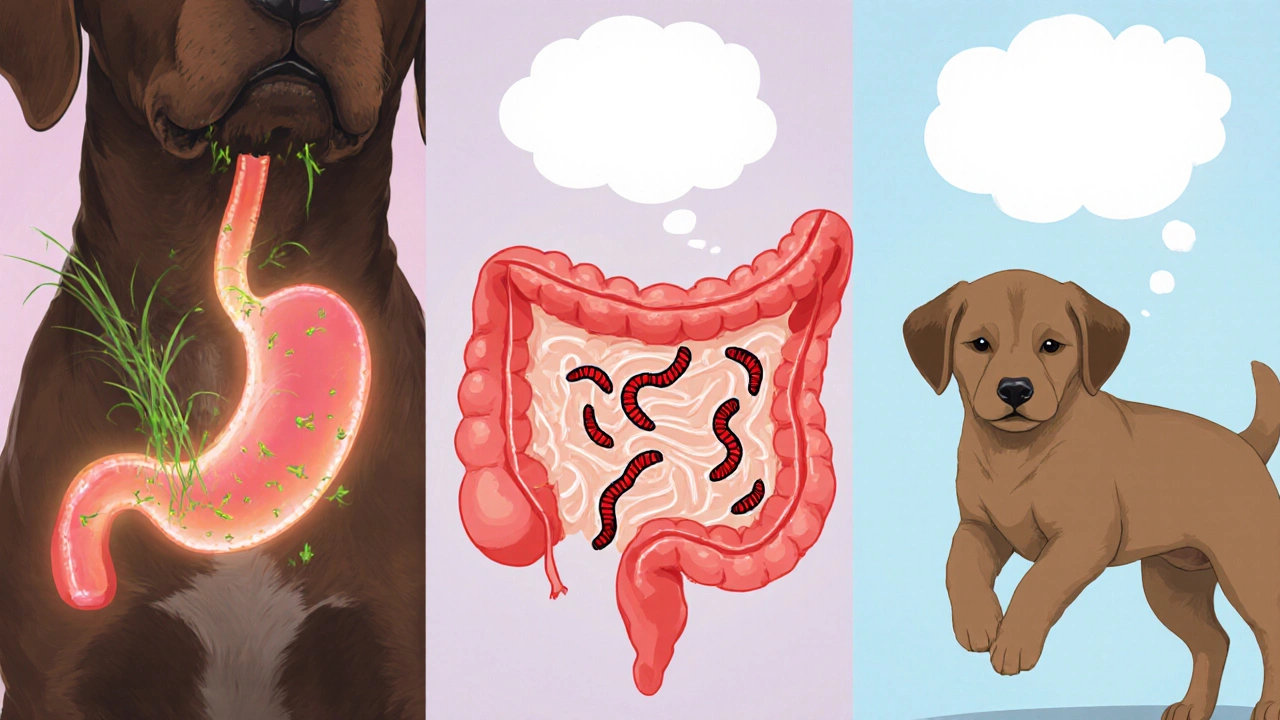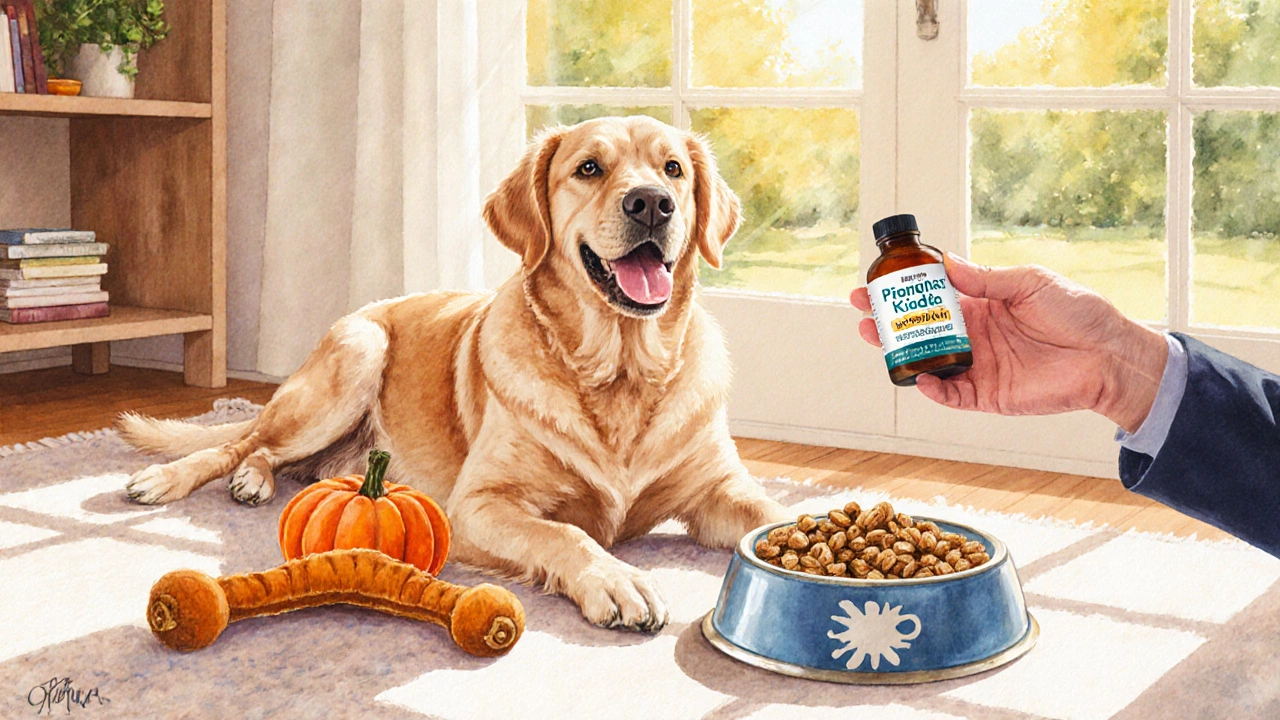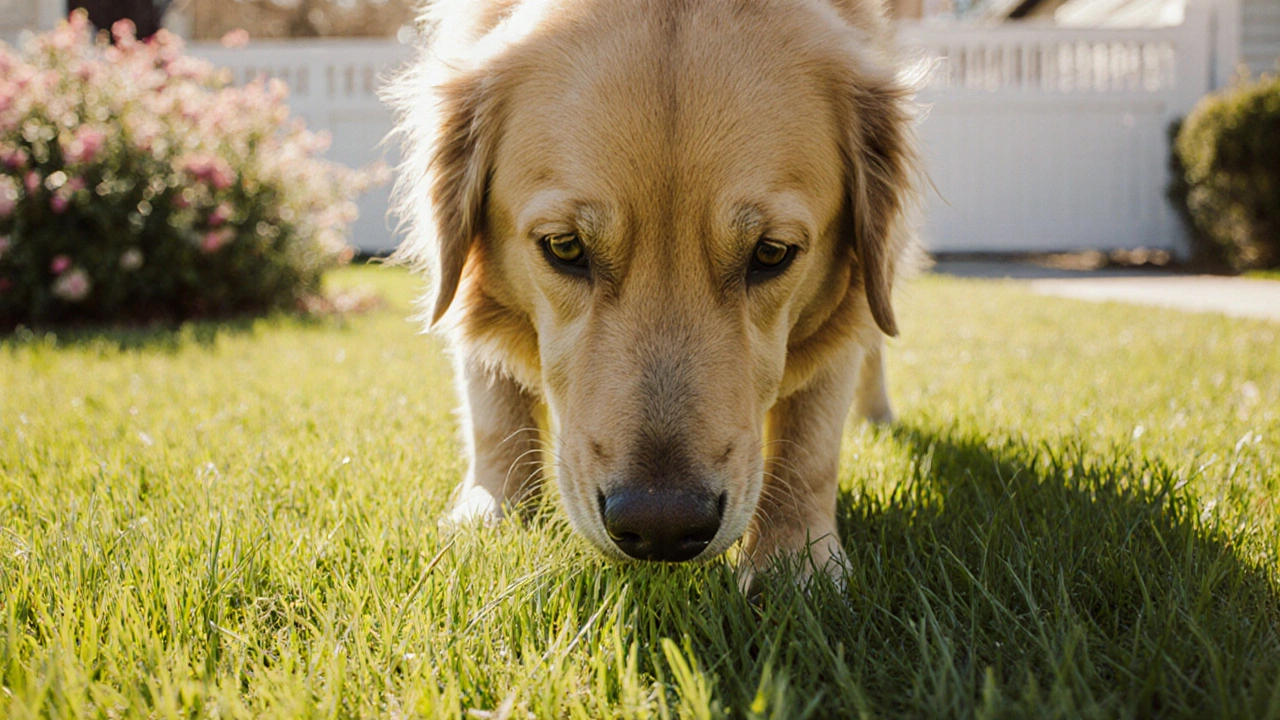Grass eating in dogs is a common behavior where canines chew or swallow grass, often puzzling owners. Most pet parents wonder if it signals a health problem or is just a quirky habit. This guide unpacks the science, lists the real reasons, points out warning signs, and shows how to keep your pup happy without the mystery.
What Does Grass Eating Look Like?
Dogs may nibble on a single blade, gulp down a handful, or even roll around in a lawn before chewing. The act can happen during a walk, in the backyard, or when a fresh patch catches their eye. While occasional snacking is harmless for many, frequent or frantic grazing might hint at an underlying issue.
Top Reasons Dogs Eat Grass
Researchers and veterinarians agree that there isn’t a single answer. Below are the most documented triggers.
| Reason | Typical Signs | When to Worry |
|---|---|---|
| Dietary Fiber Gap | Loose stools, occasional vomiting after eating grass | If stools stay soft & you see weight loss |
| Stomach Upset | Drooling, pacing, occasional regurgitation | Persistent vomiting or lethargy |
| Parasites | Itching, visible worms in feces, loss of appetite | Repeated episodes despite diet changes |
| Nutritional Deficiency | Dull coat, slow growth (puppies), frequent grazing | Visible skin issues, recurrent infections |
| Stress or Boredom | Chewing on anything, including shoes, plants | Destructive behavior spreads beyond grass |
| Instinctual Behavior | Occasional nibble, no other symptoms | Rarely a concern |
1. Fiber‑Fix: The Nutritional Angle
Grass is mostly cellulose, a type of Dietary fiber that many commercial dog foods lack in sufficient quantities. When a dog's diet is low on fiber, the gut may signal a craving for something rough to help move material along.
Adding a fiber supplement, such as canned pumpkin or psyllium husk, often reduces the urge. Look for products labeled for Dog health supplements that contain 1-3% fiber per serving.
2. Upset Stomach - The Self‑Soothing Theory
Some experts think dogs eat grass to induce vomiting when their stomach feels queasy. The rough blades can tickle the throat, prompting a gag reflex. This usually results in a brief episode of vomit followed by a calm period.
If your dog only vomits after chewing grass and otherwise looks fine, it’s likely a harmless remedy. However, frequent vomiting can lead to dehydration, so monitor water intake closely.

3. Parasites & Internal Irritants
Intestinal parasites such as hookworms or giardia can irritate the gut lining. The irritation may trigger a craving for grass as the body attempts to dislodge the irritants.
A simple fecal test at your Veterinarian can confirm the presence of parasites. Treatment is usually a single deworming dose, followed by a preventive regimen.
4. Nutritional Deficiencies
Deficiencies in minerals like magnesium, potassium, or certain vitamins may manifest as odd eating habits. Grass contains trace amounts of these nutrients, giving dogs a quick, natural supplement.
Blood work can reveal shortfalls. If a deficiency is identified, switch to a balanced, high‑quality kibble or add a targeted supplement.
5. Stress, Boredom, and Play
Dogs are intelligent creatures that need mental stimulation. When left alone for long periods, they may turn to grass as a novel chew item. This falls under the broader category of Behavioral stress.
Increasing walk time, interactive toys, or puzzle feeders can divert attention away from the lawn.

When to Call the Vet
- Grass eating is accompanied by chronic vomiting or diarrhea.
- Your dog shows signs of weight loss despite a normal appetite.
- There’s blood in the vomit or stool.
- Frequent episodes of flatulence or abdominal bloating.
These could signal serious conditions like gastrointestinal blockage, severe parasites, or organ disease. Early intervention improves outcomes.
Practical Tips to Manage the Habit
- Check the diet. Ensure the food meets AAFCO standards and includes a fiber source.
- Provide safe chew alternatives. Natural sticks, dental chews, or rawhide (if tolerated) can satisfy the urge.
- Schedule regular vet check‑ups. Annual blood panels and fecal exams catch hidden problems.
- Limit lawn exposure. Supervise outdoor time and keep grass short to reduce temptation.
- Consider a probiotic. Adding a canine‑specific probiotic supports gut flora, reducing gastrointestinal irritability.
Common Myths Debunked
Myth: All dogs that eat grass are going to die.
Fact: Most healthy dogs chew grass without any long‑term harm. It becomes a concern only when paired with other clinical signs.
Myth: Grass is poisonous to dogs.
Fact: Fresh, untreated grass is non‑toxic. However, lawns treated with pesticides, herbicides, or fertilizers can be dangerous. Always verify your garden’s chemical usage.
Bottom Line
Grass eating is a multi‑faceted behavior. The key is to observe patterns, check diet quality, and rule out medical issues. With a balanced diet, regular vet care, and a little enrichment, most dogs will ease off the lawn and stick to their bowls.
Is it normal for my dog to eat grass every day?
Occasional grazing is common and usually harmless. Daily eating may indicate a fiber gap or a lingering stomach upset, so review the diet and watch for other symptoms.
Can grass cause diarrhea or vomiting?
Yes. The rough texture can irritate the lining, leading to loose stools or a gag‑induced vomit. If symptoms persist after a few episodes, consult a veterinarian.
Should I stop my dog from eating grass?
Only if the grass is treated with chemicals or if your dog shows signs of illness. Otherwise, redirect the behavior with safe chews and ensure the diet is complete.
Do I need a stool test for my grass‑eating dog?
A fecal exam is a good first step, especially if you notice worms, blood, or a change in stool consistency. It helps rule out parasites.
Can supplements stop my dog from eating grass?
Supplements that add fiber, probiotics, or missing vitamins often reduce the habit. Choose products formulated for dogs and follow the dosage guidelines.
